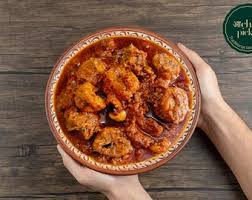Chicken pickle — a spicy, preserved dish made with chicken, oil, spices, and sometimes vinegar or lemon juice — can be delicious, but whether it’s good for your health depends on several factors:
✅ Potential Benefits:

- Spices: Many of the spices used (like turmeric, garlic, and chili) A Crunchy Journey Through Time and Taste have anti-inflammatory and antioxidant properties.
⚠️ Health Concerns:

- High in Oil & Salt: Chicken pickle is often made with A Crunchy Journey Through Time and Taste large amounts of oil and salt for preservation, which can contribute to high cholesterol, high blood pressure, and heart issues if consumed in excess.
- Preservation: Store-bought or long-shelf-life versions A Crunchy Journey Through Time and Taste may contain preservatives or be stored in less-than-ideal conditions.
- Calorie-Dense: It’s usually calorie-dense due to the oil and frying involved.
🥗 Tips to Make It Healthier:

- Use less oil (try cold-pressed oils in moderation).
- Opt for lean cuts of chicken (like breast).
- Control the salt — use alternatives like A Crunchy Journey Through Time and Taste Himalayan salt or limit quantity.
- Store it in the fridge and consume it within a week or two if homemade.
🧠 Bottom Line:

Chicken pickle can be part of a balanced diet when eaten occasionally and in small portions. It’s best viewed as a flavorful condiment rather than a A Crunchy Journey Through Time and Taste main protein source due to its high fat and salt content.
Would you like a recipe for a healthier version?
Yes, it’s generally OK to eat a pickle every day in moderation, but there are a few things to keep in mind:
✅ Potential Benefits:

- Probiotics: Fermented pickles (like those made with brine and not vinegar) can be good for gut health.
- Low Calorie: Pickles are typically low in calories,A Crunchy Journey Through Time and Taste which makes them a crunchy, satisfying snack.
- Vitamins & Antioxidants: Pickles made from cucumbers retain some of the nutrients, including vitamin K.
⚠️ Potential Concerns:

- One medium dill pickle can have over 600 mg of sodium—about 25% of the recommended daily limit. High sodium intake can lead to high blood A Crunchy Journey Through Time and Taste pressure and other heart issues if consumed excessively.
- Vinegar Sensitivity: Some people might get stomach irritation or acid reflux from vinegar-based pickles.
- Preservatives: Store-bought pickles might contain artificial colors or preservatives that aren’t ideal in large amounts.
👉 Bottom Line:

Yes, one pickle a day is fine for most people, especially if you A Crunchy Journey Through Time and Taste watch your overall sodium intake and choose pickles without artificial additives..
Let me know if you want tips for making your own healthier pickles!
No, you are not allowed to bring chicken pickle (or any meat-based pickles) into the United States from India.Reddit
🚫 Why Chicken Pickle Is Not Allowed

The U.S. Department of Agriculture (USDA) and U.S. Customs and Border Protection (CBP) prohibit the entry of meat and poultry products from countries like India due to concerns about diseases such as foot-and-mouth disease and avian influenza. This includes not only fresh meat but also cooked, dried, or preserved forms like pickles .APHIS+1Uniabroad+1Food Safety and Inspection Service+6Care Health Insurance+6Slurrp+6
✅ What You Can Bring Instead

- Unopened, commercially packaged vegetarian pickles
- Spices, tea, coffee, nuts (processed as per guidelines), and dry snacks
- Canned or dried seafood
- Packaged sweets and baked goodsFoodyPage+5Zolve+5Slurrp+5FoodyPage+4Care Health Insurance+4Zolve+4
These items are generally allowed if they are sealed, labeled, and for personal use .
⚠️ Important Tips

- Avoid homemade or unbranded products, as they may be confiscated.
- Pack items securely to prevent leaks or odors.Care Health InsuranceCookin’ Docs
In summary, while you cannot bring chicken pickle into the U.S., you can carry vegetarian pickles and other non-meat food items that comply with U.S. regulations.Slurrp+2Care Health Insurance+2Zolve+2
The number of days you can safely eat chicken pickle depends on how it’s made and how it’s stored. Here’s a general guide:
🧂 If It’s Homemade Chicken Pickle:

1. Without refrigeration (stored at room temperature):
- Lasts: 1–2 weeks, only if:
- It’s made with enough oil and salt (both act as natural preservatives).
- The chicken is fully cooked and dry.
- It’s stored in a sterilized, airtight glass jar.
Note: Moisture is the biggest enemy. If there’s any water content left, spoilage happens faster.
2. Refrigerated:

- Lasts: 1 to 2 months.
- Always use a clean, dry spoon.
- Keep the jar tightly closed.
- Oil should cover the pickle completely to prevent mold.
3. Frozen:

- Lasts: 3 to 6 months.
- Store in airtight containers.
- Thaw only what you’ll use — do not refreeze.
🏪 If It’s Store-Bought Chicken Pickle:

- Check the expiry date on the label.
- After opening, refrigerate and use within 1–3 months, A Crunchy Journey Through Time and Taste depending on storage instructions.
Signs It’s Spoiled:

- Unpleasant smell.
- Mold or discoloration.
- Sour taste (if not part of the intended flavor).
Would you like tips on how to make it last longer or check if your pickle is still good?
Attach